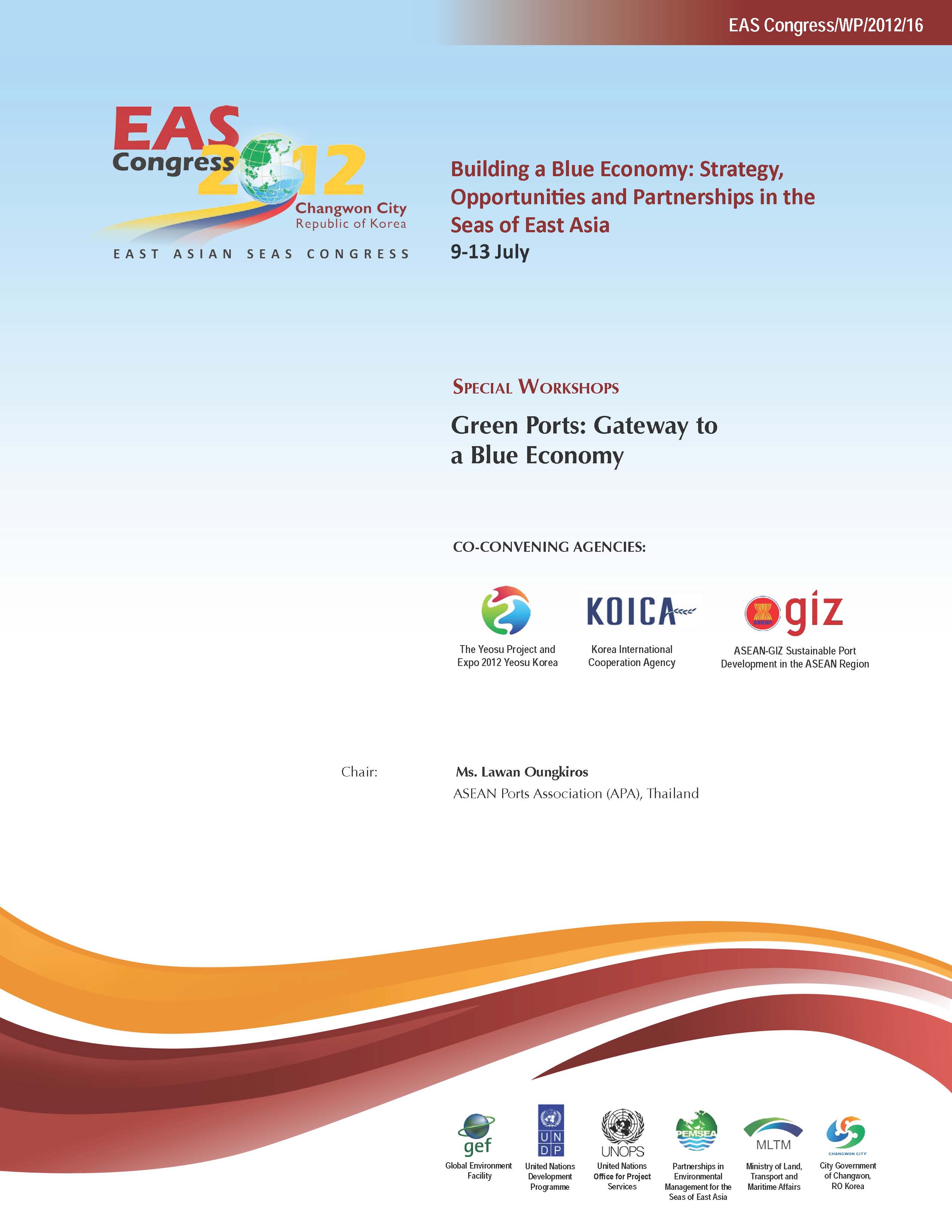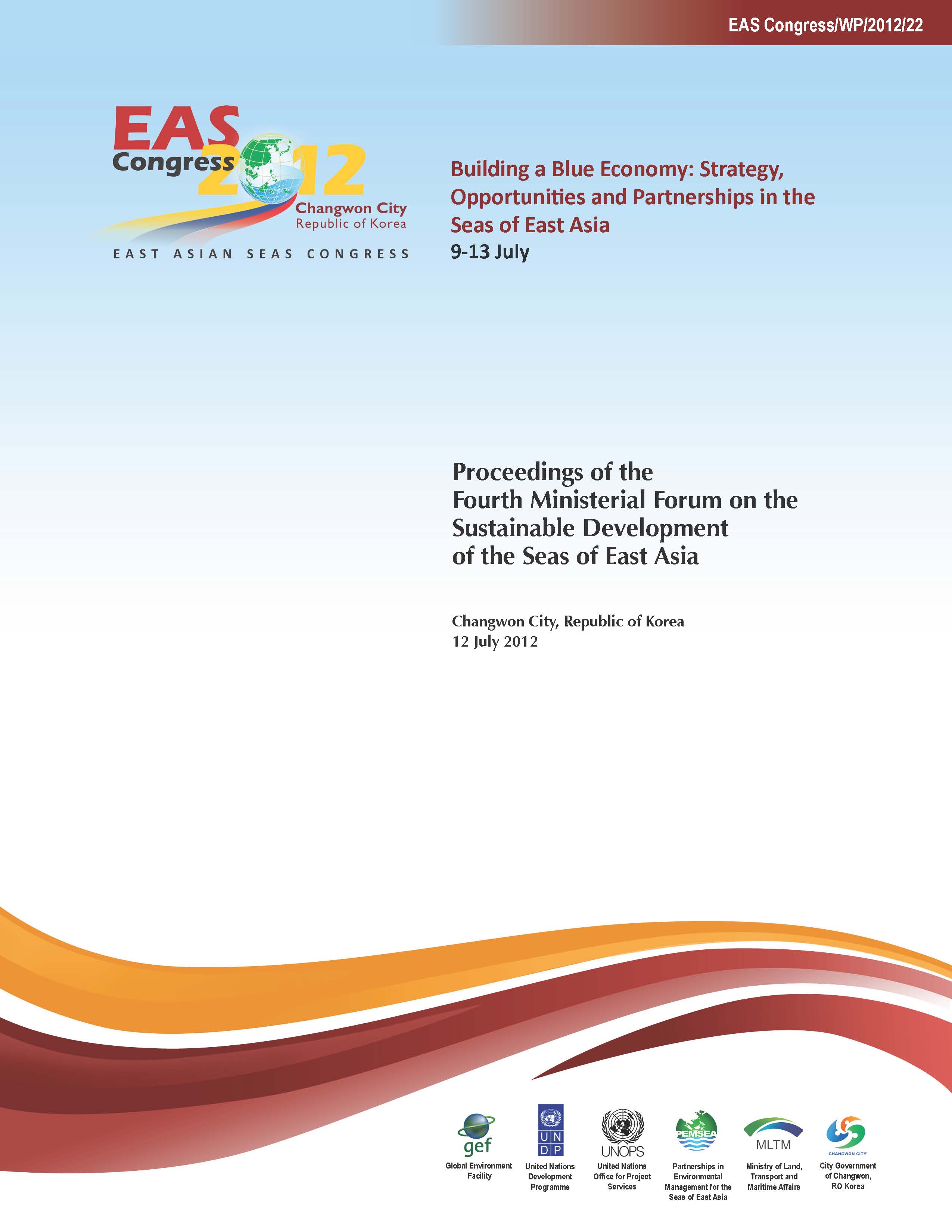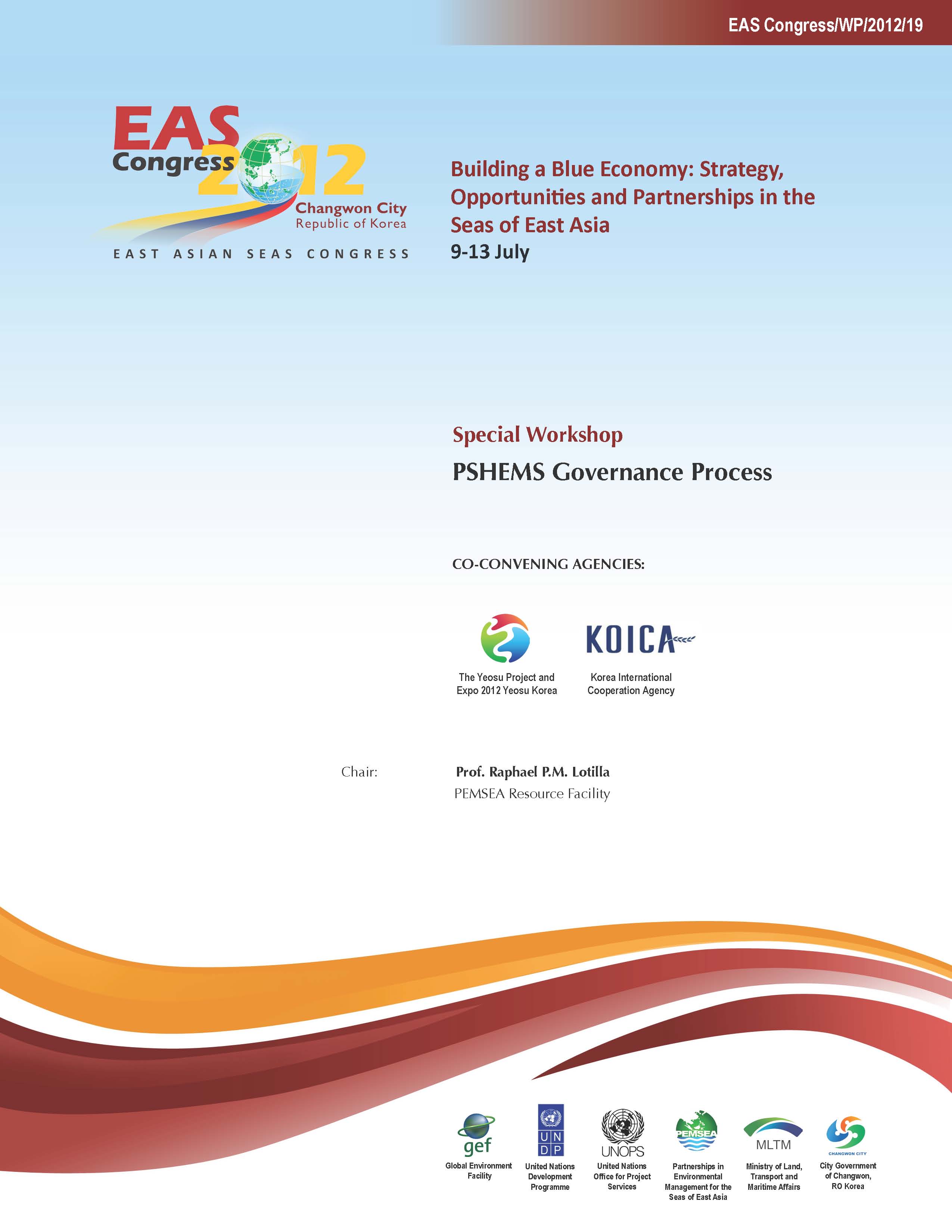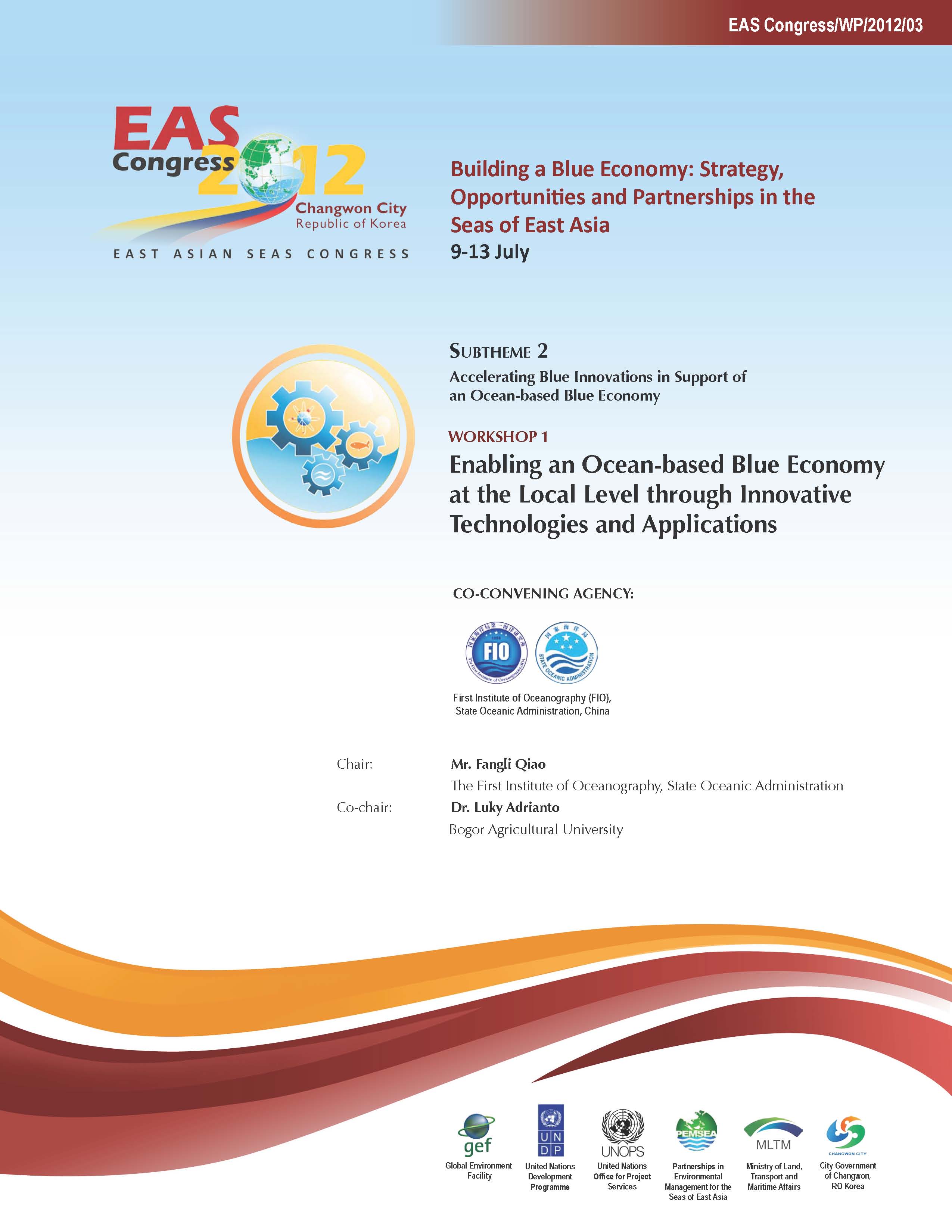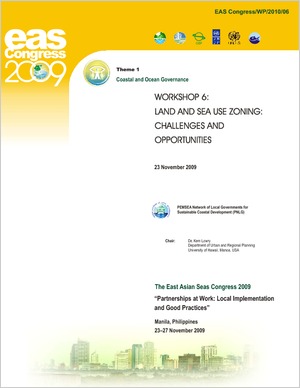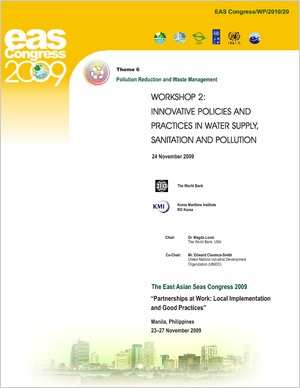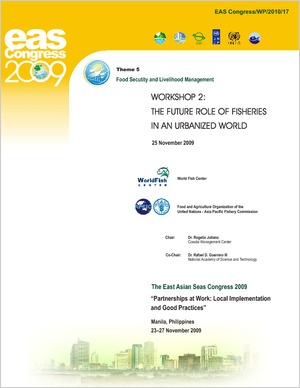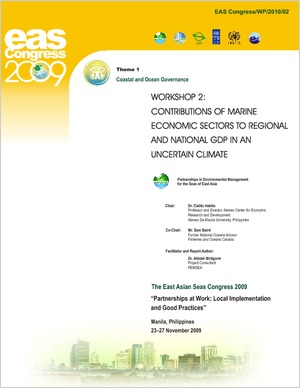
Breadcrumb
Proeceedings of the Speciel Workshop on Green Ports: Gateway to a Blue Economy
This publication summarizes the results of the workshop on Green Ports: Gateway to a Blue Economy held during the East Asian Seas Congress 2012. The workshop highlighted new initiatives by international and regional organizations, port authorities and port operators to implement safety, health and environmental programs/controls in the port to support the adoption of relevant convention, codes and standards for safety, health and environment. Current initiatives of the ports in the region, in particular, those that have developed and implemented Port, Safety, Health and Environmental Management System (PSHEMS), were likewise examined taking into consideration their overall role as gateways to a Blue Economy.
Proceedings of the Fourth Ministerial Forum on the Sustainable Development of the Seas of East Asia
This publication summarizes the results of the the Fourth Ministerial Forum on the Sustainable Development of the Seas of East Asia held during the East Asian Seas Congress 2012. The 4th Ministerial Forum on the Sustainable Development of the Seas of East Asia, the culminating event of the East Asian Seas (EAS) Congress 2012, in Changwon City, Republic of Korea, on the theme "Building a Blue Economy: Strategy, Opportunities and Partnerships in the Seas of East Asia," was held on 12 July 2012. Participating in the forum were 11 Ministers from the Seas of East Asia countries and observers from among the PEMSEA Non-Country Partners, together with PEMSEA's East Asian Seas Partnership Council Executive Committee, representatives from PEMSEA’s sponsoring agencies, the GEF, UNDP and the World Bank, and other observers from the local governments and the private sector.
Proceedings of the Workshop on The Future of the Maritime Transport in a Blue Economy
This publication summarizes the results of the workshop on the Future of the Maritime Transport in a Blue Economy held during the East Asian Seas Congress 2012. The various workshops highlighted and discussed the work of IMO and other international organizations, national and local government units and the private sector on their efforts in reducing the impacts of pollution caused by sea transportation and oil production including initiatives in enhancing capacities for oil spill preparedness and response at the regional, national and local level, specifically on the following: Global Regulatory Framework Toward Green Shipping IMO's Integrated Technical Cooperation Programme (ITCP) Ballast Water Control and Management Climate Change and Offshore Carbon Capture and Storage (CCS) Current Trends, Issues and Research and Development (R&D) Requirements in Oil Spill Response IMO-IPIECA Global Initiative (GI) in Southeast Asia Lessons Learned from Recent Oil Spill Incidents (Macondo Blowout and Hebei Spirit) Regional Arrangements on Oil Spill Preparedness and Response Developments in the Compensation Regime for Oil and Hazardous and Noxious Substances (HNS) Incidents Case Study on Oil Removal Operation from Sunken Kyungshin Building Capacities for Oil Spill Preparedness and Response at the Local Level HNS Preparedness and Response
Proceedings of the Special Workshop on the PSHEMS Governance Process
This publication summarizes the results of the Special Workshop on PSHEMS Governance Process held during the East Asian Seas Congress 2012. The workshop on PSHEMS Governance Process was convened to discuss the governance mechanism and processes for the operationalization of the Port Safety, Health and Environmental Management System (PSHEMS).
Proceedings of the Workshop on Enabling an Ocean-based Blue Economy at the Local Level through Innovative Technologies and Applications
This publication summarizes the results of the workshop on Enabling an Ocean-based Blue Economy at the Local Level through Innovative Technologies and Applications held during the East Asian Seas Congress 2012. The workshop was able to present examples of innovative technologies and approaches for maintaining and restoring ecosystem services and integration of the technologies into government programs through development plans and master plans. The discussions also highlighted the importance of using science in a meaningful way to guide local management decisions and actions for the protection of ecosystem services, developing the social capital, ensuring involvement of people, knowledge-sharing and learning from good practices as well as failures.
Proceedings of the Workshop on Land and Sea Use Zoning: Challenges and Opportunities
This publication summarizes the results of one of the workshops held during the East Asian Seas Congress 2009 on Land and Sea Use Zoning: Challenges and Opportunities. The session at the International Conference aimed to facilitate a sharing of ideas and strategies on how existing zoning plans can be strengthened and effectively enforced at the local level. It aimed to answer the following: How can local governments zone for climate change? Can land and sea-use zoning scheme be used as a market-based instrument for managing coastal and marine areas? How are local governments effectively implementing land and sea-use zoning?
Proceedings of the Workshop on Innovative Policies and Practices in Water Supply, Sanitation and Pollution
This publication summarizes the results of one of the workshops held during the East Asian Seas Congress 2009 on Innovative Policies and Practices in Water Supply, Sanitation and Pollution. This workshop aimed to showcase new and innovative policies, practices, and financing approaches, and promote enhanced public-private partnership for pollution reduction. Dr. Magda Lovei of the World Bank and Mr. Ned Clarence-Smith of UNIDO chaired and co-chaired this workshop.
Proceedings of the Workshop on the Future Role of Fisheries in an Urbanized World
This publication summarizes the results of one of the workshops held during the East Asian Seas Congress 2009 on the Future Role of Fisheries in an Urbanized World. This workshop tackles the issues that have been ailing the fisheries sector and how it is impacting the sustainability of fisheries resources in the context of ensuring food security. Providing seafood for consumers, in a time when the resources have been severely depleted, and where ecosystems have been altered (in most places, irreparably), had remained a fisheries management’s dilemma. Attempts to solve fish problems within the sector have proved difficult in most cases. With other problems arising external to the sector, but having a negative impact as well, fisheries management is anything but an easy walk in the park. It is in fact complex if not mind boggling. This publication attempts to thread the information and several perspectives from the workshop, distill some lessons and link fisheries management to PEMSEA’s advocacy of an integrated approach to ocean and coastal governance.
Proceedings of the Workshop on Contributions of Marine Economic Sectors to Regional and National GDP in an Uncertain Climate
This publication summarizes the results of one of the workshops held during the East Asian Seas Congress 2009 on the Contributions of Marine Economic Sectors to Regional and National GDP in an Uncertain Climate. The economic contribution of marine activities is considered to be an increasingly important part of the economy and international trade within and across East Asian Seas (EAS) countries. Given the archipelagic nature of the South East Asian economies and the rapid development of coastal and marine areas in the EAS economies, it appears that the approaches to most of the national economic and development plans are still land-based. How will these marine economic sectors continue to contribute sustainably to regional and national GDPs at these levels, as the impacts of climate change shape the economics of the region in the coming century? With countries forecasting further development of their marine sectors, the challenging question is not only how countries will achieve their planned objectives, but also how they can ensure that such development will serve as an enabling vehicle for sustainable development, uplifting of the quality of life, addressing the current issues of mitigation and adaptation policies and strategies in response to climate change, and the movement of populations from rural hinterlands to the coasts.
